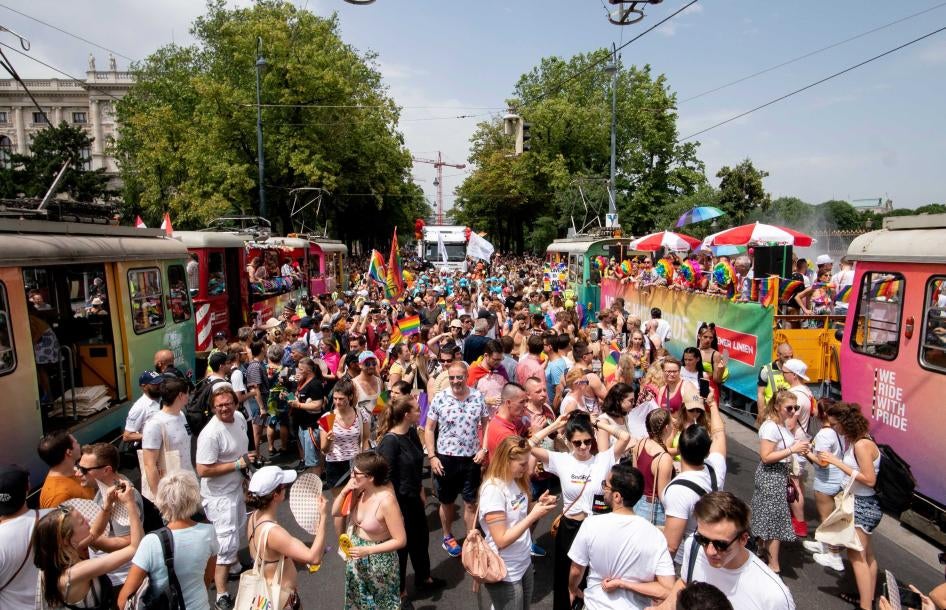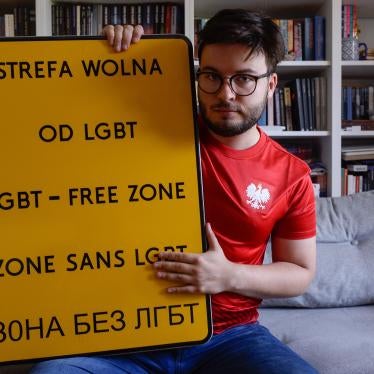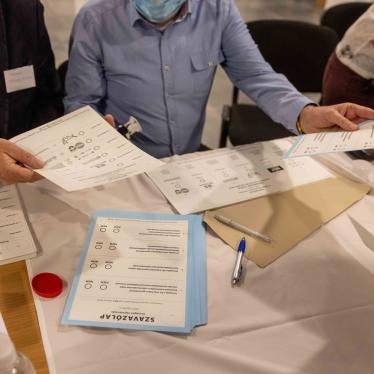Update: On September 17, EuroPride 2022 went ahead, after EuroPride organizers notified authorities of a new route and received guarantees from the Prime Minister on Saturday morning that the March could go ahead safely. More than 5,000 police and military officers were deployed across Belgrade and 64 counter-protestors were arrested, according to Serbian authorities. At least seven LGBT people were attacked after the march, which victims reported to police. Thousands of participants walked from the Constitutional Court in Belgrade to a nearby park, along a much shorter route than originally planned. They were joined by the Council of Europe Human Rights Commissioner, Dunja Mijatović, the European Commissioner for Equality, Helena Dalli, Members of the European Parliament, and dozens of diplomats as well as other European and international leaders, marching in solidarity and in support of the rights to freedom of assembly and expression.
(Berlin) – The Serbian government should immediately rescind its ban on EuroPride events scheduled for Belgrade in September 2022, Human Rights Watch said today. Instead, the authorities should work with organizers to ensure adequate safety for participants.
On August 27, President Aleksandar Vucic announced that the government is cancelling EuroPride, a regional event promoting equality for lesbian, gay, bisexual, and transgender (LGBT) people that Serbia was poised to host from September 12 to 18, with a march on September 17. Vucic acknowledged that the move is a “violation of minority rights,” but justified his decision because of threats from right wing groups to disrupt the event and rising border tensions with Kosovo. Prime Minister Ana Brnabic, a lesbian who is the first woman to hold the position, supported the cancellation, saying, “the first inviolable thing is to ensure peace and stability in the country.”
“The Serbian government’s decision to cancel EuroPride is a shameful surrender to, and implicit sanctioning of, bigotry and threats of unlawful violence,” said Graeme Reid, director of the LGBT rights program at Human Rights Watch. “Street protests by far-right groups and religious entities have already taken place. Now Serbia has an obligation to also ensure the safety and dignity of EuroPride participants.”
The government announcement followed a demonstration by thousands of people on August 27 in Belgrade opposing the Europride events, with slogans such as, “save our children and our family.”
Organizers have indicated that they have not received formal notification of a ban and intend to hold the event as planned. “President Vucic cannot cancel someone else’s event,” said Kristine Garina, president of the European Pride Organizers Association. “EuroPride is not cancelled, and will not be cancelled. During the bidding process for EuroPride 2022, Prime Minister Brnabic promised the full support of the Serbian government … and we expect that promise to be honored,”
The co-chair of the European Parliament’s LGBTI InterGroup has indicated that she will attend regardless of Vucic’s cancellation. Serbian civil society groups indicated at the end of August that they plan to appeal any ban in court. Vucic has responded to criticism by saying, without sharing details, that the government will enforce the ban: “If a gathering is banned, then it will be banned. There will be no games with state decisions.”
The Serbian government, after banning Pride events between 2011 and 2013, has allowed parades in Belgrade since 2014, which have been peaceful. Serbian authorities’ justification for cancelling EuroPride 2022 bears a striking resemblance to Russia’s arguments, for banning marches by LGBT people on grounds that they could lead to violent clashes with counterdemonstrators. The European Court of Human Rights struck down that argument in Alekseyev v. Russia in 2010 as a violation of the right to peaceful assembly.
In rejecting the Russian government's argument, the court reiterated that there is “no ambiguity” about “the right of individuals to openly identify themselves as gay, lesbian or any other sexual minority, and to promote their rights and freedoms, in particular by exercising their freedom of peaceful assembly.” The court emphasized that by refusing LGBT rights activists the right to peaceful assembly, “the authorities effectively endorsed the intentions of persons and organizations that clearly and deliberately intended to disrupt a peaceful demonstration in breach of the law and public order.”
Rather than banning demonstrations because third parties threaten public order, the authorities should be fulfilling their duty to ensure that police protect peaceful demonstrators exercising their right to freedom of assembly, Human Rights Watch said. Based on human rights jurisprudence regarding pride marches, law enforcement authorities should remember they are there to protect those participating in the event.
As a member of the Council of Europe, Serbia should adhere to the Council’s standards to combat discrimination on grounds of sexual orientation or gender identity, including that member states should ensure everyone’s freedom of peaceful assembly without any discrimination on grounds of sexual orientation and gender identity. The Council of Europe standards also say governments should not misuse legal and administrative provisions to impose restrictions on freedom of expression and peaceful assembly on grounds of public health, public morality, and public order.
Article 21 of the International Covenant on Civil and Political Rights, which Serbia ratified in 2001, explicitly protects the right to peaceful assembly. In a 2016 report, the UN special rapporteur on the rights to freedom of peaceful assembly and of association specified that, “The State’s failure to protect participants in a peaceful rally against violent, fundamentalist counter-protesters, for example, constitutes a violation of the right to freedom of peaceful assembly.” The special rapporteur said that the government “has a positive duty to protect those exercising their right to peaceful assembly, even if they are promoting unpopular positions (e.g., rights for LGBTI persons or those of a minority religion).”
In a 2022 report, the rapporteur emphasized that “Protests have been particularly important in facilitating participation of otherwise excluded groups such as … LGBTQI+ persons and other marginalized communities and victims’ groups … Where States adopt securitized, hostile approaches to protests, rather than welcoming them as an important part of democratic life, the result is often to deepen underlying crises.”
“Instead of opportunistically pandering to anti-rights groups, Serbian authorities should work with EuroPride organizers to make the event safe and guarantee the right to peaceful assembly,” Reid said. “Threats against LGBT people’s dignity and rights should receive a serious reaction from the government. Cancelling a regional event is the wrong move.”









